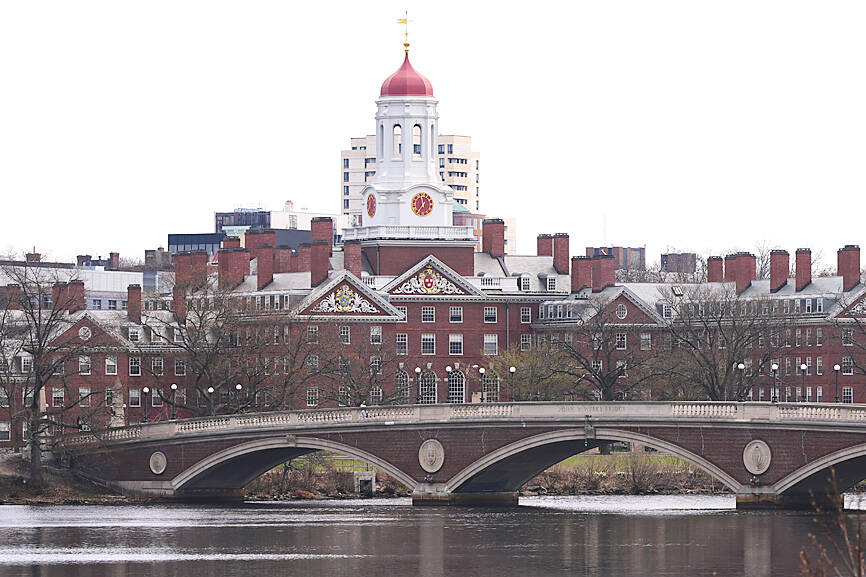More than 170 university, college and scholarly society presidents yesterday published a joint statement opposing the treatment by US President Donald Trump’s administration of higher education institutions, coming together to speak out after Harvard University said the administration was threatening its independence.
The statement, signed by presidents from such institutions as Princeton, Brown, Harvard, the University of Hawaii and Connecticut State Community College, criticized what it described as “the unprecedented government overreach and political interference now endangering American higher education.”
“We are open to constructive reform and do not oppose legitimate government oversight,” the statement said. “However, we must oppose undue government intrusion in the lives of those who learn, live, and work on our campuses.”

Photo: AP
The White House did not respond to a request for comment about the statement.
The joint statement is the latest show of resistance from US higher education leaders as the Trump administration seeks to leverage its financial heft to overhaul academia.
On Monday last week, Harvard rejected numerous demands from the administration, which is seeking oversight of the university’s student body, faculty and curriculum in an apparent effort to curb what it perceives as its liberal bias.
Soon after, the administration announced it was freezing US$2.3 billion in federal funding to the school.
A statement by White House deputy press secretary Harrison Fields at that time said Trump wants to ensure taxpayer dollars do not support racial discrimination or racially motivated violence.
The administration also threatened to strip Harvard of its tax-exempt status and take away its ability to enroll foreign students.
On Monday, Harvard sued the Trump administration to try to force it to end its orders freezing funds and withdraw demands it has made, accusing the federal government of trying to overhaul Harvard’s governance, control its faculty hiring and dictate what faculty may teach its students.
On Monday, Harvard sued the Trump administration to try to force it to end its orders freezing funds and withdraw demands it has made, accusing the federal government of trying to “overhaul Harvard’s governance, control Harvard’s faculty hiring and dictate what faculty may teach Harvard students” for ideological reasons.
Harvard said in its lawsuit that government attempts to “coerce and control” the university violated the Constitution’s protections for speech. It also accused the government of failing to follow procedures set out under federal civil rights laws.

LONG FLIGHT: The jets would be flown by US pilots, with Taiwanese copilots in the two-seat F-16D variant to help familiarize them with the aircraft, the source said The US is expected to fly 10 Lockheed Martin F-16C/D Block 70/72 jets to Taiwan over the coming months to fulfill a long-awaited order of 66 aircraft, a defense official said yesterday. Word that the first batch of the jets would be delivered soon was welcome news to Taiwan, which has become concerned about delays in the delivery of US arms amid rising military tensions with China. Speaking on condition of anonymity, the official said the initial tranche of the nation’s F-16s are rolling off assembly lines in the US and would be flown under their own power to Taiwan by way

OBJECTS AT SEA: Satellites with synthetic-aperture radar could aid in the detection of small Chinese boats attempting to illegally enter Taiwan, the space agency head said Taiwan aims to send the nation’s first low Earth orbit (LEO) satellite into space in 2027, while the first Formosat-8 and Formosat-9 spacecraft are to be launched in October and 2028 respectively, the National Science and Technology Council said yesterday. The council laid out its space development plan in a report reviewed by members of the legislature’s Education and Culture Committee. Six LEO satellites would be produced in the initial phase, with the first one, the B5G-1A, scheduled to be launched in 2027, the council said in the report. Regarding the second satellite, the B5G-1B, the government plans to work with private contractors

‘OF COURSE A COUNTRY’: The president outlined that Taiwan has all the necessary features of a nation, including citizens, land, government and sovereignty President William Lai (賴清德) discussed the meaning of “nation” during a speech in New Taipei City last night, emphasizing that Taiwan is a country as he condemned China’s misinterpretation of UN Resolution 2758. The speech was the first in a series of 10 that Lai is scheduled to give across Taiwan. It is the responsibility of Taiwanese citizens to stand united to defend their national sovereignty, democracy, liberty, way of life and the future of the next generation, Lai said. This is the most important legacy the people of this era could pass on to future generations, he said. Lai went on to discuss

MISSION: The Indo-Pacific region is ‘the priority theater,’ where the task of deterrence extends across the entire region, including Taiwan, the US Pacific Fleet commander said The US Navy’s “mission of deterrence” in the Indo-Pacific theater applies to Taiwan, Pacific Fleet Commander Admiral Stephen Koehler told the South China Sea Conference on Tuesday. The conference, organized by the Center for Strategic and International Studies (CSIS), is an international platform for senior officials and experts from countries with security interests in the region. “The Pacific Fleet’s mission is to deter aggression across the Western Pacific, together with our allies and partners, and to prevail in combat if necessary, Koehler said in the event’s keynote speech. “That mission of deterrence applies regionwide — including the South China Sea and Taiwan,” he